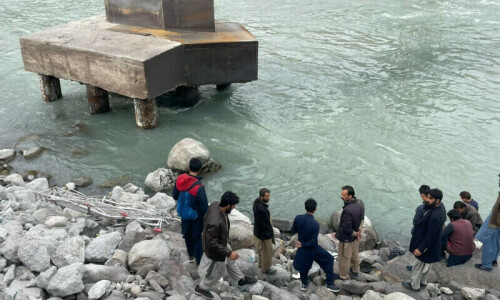RAIPUR, Nov 14: Indian troops battled Maoist rebels in the east of the country on Friday as violence marred the start of a string of key state elections seen as a popularity test for the ruling party.
Leftwing guerillas in Chhattisgarh state fought more than two dozen gunbattles, which left a trooper dead. They also ran away with electronic voting machines from 21 poll centres, a police spokesman said.
An Indian air force engineer was killed when Maoists fired on a low-flying helicopter over the insurgency-hit Jagdalpur district, he said.
“There also have been several cases of abductions of officials,” he said in state capital of Raipur.
“The aim is to create fear in the minds of people so that they will not come to vote,” said another police official.
Officials in Raipur said 40,000 police and soldiers guarded the polling stations.
India’s election commission in New Delhi said 55 per cent of the 6.3 million registered voters exercised their franchise in the first leg of the two-phase balloting in Chattisgarh.
Large parts of the densely-forested south of Chhattisgarh are under rebel control and around half of the 8,879 booths were designated “sensitive” or “hyper-sensitive.”
Prime Minister Manmohan Singh has described the Maoists, centred on Chhattisgarh but also active in rural areas across eastern and southern India, as the biggest threat to the country’s security.
His ruling Congress party, currently the opposition grouping in the state, has made the Maoist insurgency its main election issue.
“Law and order is a major problem. It is an extension of the state being unable to harness youth energies fully. It is the unemployed youth who are major recruits into the Maoist ranks,” said Congress spokesman Tom Vadakkan.
Incumbent Chief Minister Raman Singh, of the opposition Hindu nationalist Bharatiya Janata Party (BJP), has been luring voters with the promise of cheap rice for all if he wins.
Five more states – Madhya Pradesh in the centre, revolt-hit Kashmir, New Delhi, Mizoram in the northeast and the western state of Rajasthan – will vote before the end of the year.
The string of polls comes against a backdrop of rising prices and concerns over the impact of the global financial crisis on India’s economy – with exports and manufacturing slowing, GDP growth forecasts cut and job losses expected.
They are also seen as a mini-referendum ahead of national elections, which have to be held by May 2009.
The BJP governs in three of the states voting but analysts say anti-incumbency sentiment may be offset by anger with the federal government over high inflation.
“The importance of these elections starting with Chhattisgarh is two-fold,” said political columnist Neerja Choudhury.
“The results could determine timing of general elections: If the Congress party does well, it could call general elections as early as February.
“On the other hand, if the BJP does manage to beat the anti-incumbency factor and does well, it will emerge as a strong alternative to the coalition present government,” she said.—AFP










































Dear visitor, the comments section is undergoing an overhaul and will return soon.